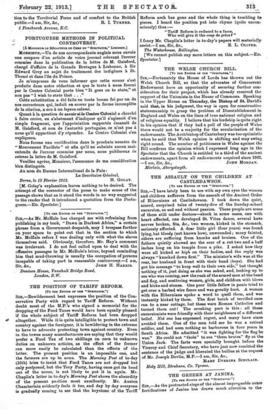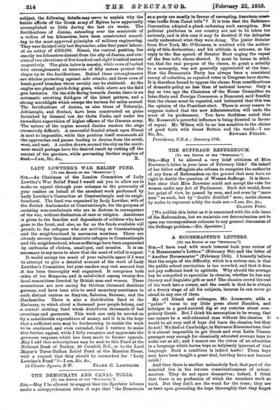THE GREEKS AT JANINA.
[To TEE EDITOR OF THE "Sructcron."1
Sin,—As the protracted siege of the almost impregnable outer fortifications of Janina has drawn much attection to the
subject, the following detalls-may serve to explain why the beroic efforts of the Greek army. of Epirus have apparently accomplished so little during the last six weeks. The fortifications of Janina. extending over the semicircle of -a radius of ten kilometres, have been constructed accord- . ing to the -most approved principles of military engineering. They were finished only last September, after four years' labour, -at an outlay of £350,000. Bizani, the central position, lies ..exactly ten kilometres distant from the city of Janina, and con- sists of two elevations of fire hundred and eight hundred metres respectively. The-plain below is marshy, while rows of barbed wire entanglements at intervals of fifty metres protect the slopes up to the fortifications. Behind these entanglements are ditches protecting against aide attacks, and three rows of bomb-proof trenches where cavalry can be sheltered. At the -angles are placed quick-firing guns, while above are the field gun batteries. On the side facing towards Janina there is an -automatic revolving fieldsgun of the latest pattern, and a -strong searchlight which sweeps the horizon for miles around. The fortifications of Janina, as also those of Tchatalja, Adrianople, and Scutari, have been constructed on plans furnished by General von der °oil& Pasha and under the immediate supervision of higher officers of the German army. The nature of the region around Janina renders the siege -excessively difficult. A successful frontal attack upon Bizani is next to impossible, while this position itself commands all the approaches and passes leading to Janina from the south, wrest, and east. A cordon drawn around the city on the north- 'west would perhaps have the desired result by cutting off the -retreat of the garri.son, while preventing further supplies of















































 Previous page
Previous page